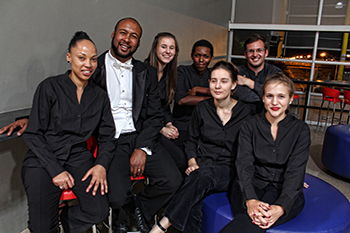Latest News Archive
Please select Category, Year, and then Month to display items
02 January 2025
|
Story Gerda-Marie van Rooyen
|
Photo Supplied
 Leading the research in South Africa is Prof Linus Franke from the Department of Soil, Crop and Climate Sciences.
Leading the research in South Africa is Prof Linus Franke from the Department of Soil, Crop and Climate Sciences.
Scientists are actively pursuing the successful breeding of diploid hybrid potatoes from inbred lines. This is expected to revolutionise potato breeding as it holds the key to rapid genetic progress. It will introduce new varieties for commercialisation through seed. Currently, existing potato variants have a gene that renders self-pollinated seeds infertile.
Prof Linus Franke, an academic in the Department of Soil, Crop and Climate Sciences at the UFS, is leading the research in South Africa. “This technology allows the production of genetically uniform potato seed that is easy to transport and largely disease-free.” He says this differs from conventional breeding whereby only vegetative propagation is possible due to tetraploid varieties in potatoes. It also risks carrying pests and diseases from one generation to the next – leading to the accumulation of pests and diseases with each round of multiplication.
Seed innovation
Prof Franke explains that Solynta BV, a seed company based in the Netherlands that produces potato varieties that can be grown from seed, has included South Africa in their research efforts because it is one of Africa’s largest producers and exporters. Through his academic relationship with Wageningen University and Research, a Dutch institution renowned for its agricultural endeavours and food production, the UFS became involved in researching hybrid potatoes grown from seed.
Diploid seeds containing two sets of chromosomes allow easier gene manipulation to increase predictability and speedier genetic progress. The breeding approach enables the incorporation of tolerance to pests, diseases, abiotic stresses (cold, heat, drought) and other desired genetic traits.
Although Prof Franke is optimistic about this research, he is not blind to disadvantages. “Potato seeds are tiny and have little energy reserves, making it harder to grow potatoes from seed than from tubers.” He says potatoes from seed will take longer to cultivate than tubers, as farmers need to grow plantlets from seeds first, adding six weeks to the growing period. “It is possible that commercial farmers can grow potatoes directly from seed. Alternatively, perhaps more likely, specialised growers will produce tubers of potatoes from seed; these tubers are then sold as seed tubers to other potato farmers, who then continue their normal practices of producing potatoes for the market from tubers.”
Financial benefits
Prof Franke says farmers have reason to get excited. “Seed potatoes will reduce input costs, as varieties with enhanced tolerance to pests and diseases require less pesticides. Planting one hectare of potatoes requires three to four tonnes of potato tubers, but only one 25 g packet of potato seeds.” Since potatoes are a more valuable commodity than maize, this technology might also increase farmers’ income potential.
OSM Camerata first place winner in international competition
2017-09-08

The OSM Camerata with conductors, Xavier Cloete and
Gerhard de Jager received first place in the
University/Conservatory Orchestra category.
Photo: Supplied
The OSM Camerata received first place in the 2017 Ictus International Music Competition for bands and orchestras. Marius Coetzee from the Odeion School of Music at the University of the Free State said: “The award was announced in time for the celebration of the orchestra’s fifth birthday.”
OSM a catalyst for excellence
The OSMC was strategically founded in 2012 by Coetzee as the OSM’s flagship chamber ensemble, with the main objective of creating a catalyst for excellence.
Over the past five years, the OSMC has premiered 15 new works by South African composers specially commissioned for them. Highlights remain its participation in the 13th International Conservatory Festival in St Petersburg Russia, where the ensemble received a standing ovation during a gala concert in the Glazunov Concert Hall, as well as the world première of the Cello Concerto for an African Cellist by South African composer, Hans Huyssen, with South African cellist, Heleen du Plessis as soloist. The CD was released in 2014 on the New Zealand Classical Music label, Ode Records in Auckland, New Zealand and was one of five CDs nominated for the Listeners' Choice Award New York in March 2014.
Competition draws participation from Washington to Bloemfontein
The inaugural year of this annual competition drew applicants from Washington State in the US all the way to Bloemfontein in the Free State. Video submissions were judged and narrowed down to a final round from which prize winners were selected.
The OSM Camerata with conductors, Xavier Cloete and Gerhard De Jager, received first place in the University/Conservatory Orchestra category.
The competition was founded to highlight the work that music educators, conductors, students, performers and community members make in ensembles at the university, community, youth, high school and middle school levels.
Competition director, Alex Serio says that “many people do not realise the amount of work that it takes to make these ensembles run. What is more is that most of the public does not realise the level of artistic excellence that can be achieved in these ensembles. Ictus International Music Competition was founded to highlight this level